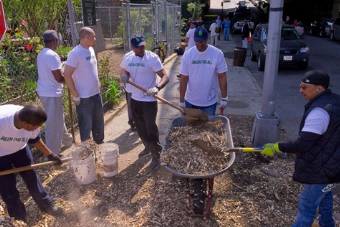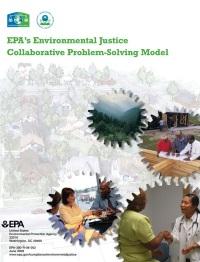ENVIRONMENTAL JUSTICE COLLABORATIVE PROBLEM-SOLVING (EJCPS) COOPERATIVE AGREEMENT PROGRAM
EPA is issuing this solicitation to request applications for projects supporting community-based nonprofit organizations (CBOs) in their efforts to collaborate and partner with other stakeholders (e.g., local businesses and industry, local government, medical service providers, academia, etc.) to develop solutions that will significantly address environmental and/or public health issue(s) in communities disproportionately burdened by environmental harms and risks. These projects will help transform disadvantaged and underserved communities into healthy, thriving communities capable of addressing the environmental and public health challenges they have historically faced, as well as current and future challenges.
The EJCPS Program is designed to address multi-statute environmental and/or public health issues. In support of this, Congress provided EPA with both funding and expanded authority to further environmental justice through financial assistance programs in the consolidated Appropriations Act, 2022 (Public Law 117-103), which provided funding for environmental justice implementation and training grants. Examples of grant applications involving implementation activities include: small-scale clean-ups, environmental treatments, pollution abatements, hazardous waste disposal and/or energy recovery projects.
Collaborative Problem-Solving Model - The program’s objective is to support projects that demonstrate the utility of the Environmental Justice Collaborative Problem-Solving Model. For the purposes of the EJCPS Program, collaborative problem-solving is defined as an effort to bring together groups and resources (e.g., information, labor, money) by three or more stakeholders to solve a set of problems that any single entity cannot solve individually. Collaborative problemsolving builds upon existing community understanding to establish and maintain partnerships capable of producing meaningful environmental and/or public health results. To provide a systematic approach towards collaborative problem-solving, OEJECR has developed a Collaborative Problem-Solving Model (Model). Such a Model is intended to assist vulnerable and underserved communities in developing proactive, strategic, and visionary approaches to address their environmental justice issues and achieve community health and sustainability.
Collaborative problem-solving also involves developing a well-designed strategic plan with a built-in evaluation component to measure and achieve results on local environmental and/or public health issues and to sustain the partnerships. These elements are cross-cutting and interdependent and should be utilized in a proactive, strategic, and iterative manner. Determining which elements to undertake, and in what order, can vary greatly, however, depending upon the unique facts and circumstances surrounding each environmental and/or public health issue.
Deadline: April 10, 2023
For this competition, EPA will give special consideration to applications that focus on the following program priority:
• Projects addressing Climate Change, Disaster Resiliency, and/or Emergency Preparedness
• Rural areas
• Health Impact Assessment (HIA)
In accordance with CFDA 66.306 (as it will be updated to be consistent with this announcement), an eligible applicant must be one of the following entities:
• a community-based nonprofit organization; or
• a partnership of community-based nonprofit organizations*
Multiple Applications – Applicants may submit only one application under this solicitation. If an applicant submits more than one, then they will be contacted by EPA prior to the evaluation process to determine which one to withdraw. However, an applicant organization may be a partner on a single application or multiple applications. Additionally, applicants can only receive one award under this EJCPS announcement.
The total estimated funding expected for all awards under this solicitation is approximately $30,000,000, broken down as follows:
• $25,000,000 for CBOs proposing projects for up to $500,000 each. Approximately 50 awards for up $500,000 each are anticipated under this track.
• $5,000,000 for qualifying small CBOs with 5 or fewer full-time employees proposing projects for up to $150,000 each. See more details under Section II.C. (Small Community-based Nonprofit Set Aside Track). Approximately 33 awards for up to $150,000 each are anticipated under this track.
Between these two tracks of funding, EPA anticipates awarding approximately 83 cooperative agreements nationwide. Cooperative agreements resulting from this announcement will be funded for a three-year performance period and are expected to be fully funded at time of award. NOTE: Due to the restrictions in CAA 138(b)(1), EPA cannot extend the performance periods for EJCPS assistance agreements beyond three years.


Environmental Justice
The environmental justice collaborative problem-solving cooperative agreement program.
- Request for Applications

Previous Project Descriptions
The Environmental Justice Collaborative Problem-Solving (CPS) Cooperative Agreement Program provides financial assistance to eligible organizations working on or planning to work on projects to address local environmental and/or public health issues in their communities, using EPA's "Environmental Justice Collaborative Problem-Solving Model." The CPS Program assists recipients in building collaborative partnerships to help them understand and address environmental and public health concerns in their communities .
The CPS Program requires selected applicants, or recipients, to use the EPA’s Environmental Justice Collaborative Problem-Solving Model as part of their projects. The model aims to address local environmental and/or public health issues in a collaborative manner with various stakeholders such as communities, industry, academic institutions, and others. Case Studies highlight some of the successful and effective strategies of previous projects.

Top of Page
Request for Proposals
The FY 2016 solicitation is now closed. One award will be made per region in amounts of up to $120,000 per award for a two-year project period. Cooperative agreements will be awarded to local community-based organizations seeking to address environmental and public health concerns in their communities through collaboration with other stakeholders, such as state and local governments, industry, academia and non-governmental organizations.
UPDATE: (November 24, 2015) The FY 2016 solicitation was amended to include additional details governing partnerships and the required training workshop. This version of the RFP supersedes all previous versions .
- FY 2016 Request for Proposals -- Amended 11/24/2015 | FY2016 Request for Proposals en Español
- FY 2016 Request for Proposals

- 2016 Project Abstracts
- 2014 Project Descriptions
- 2007 Project Descriptions
Contact Us to ask a question, provide feedback, or report a problem.
- Environmental Justice (EJ) Home
- Learn About Environmental Justice
- EJ 2020 Action Agenda
- Plan EJ 2014
- National Environmental Justice Advisory Council
- Grants and Resources
- EJ in Your Community
- Federal Interagency Working Group on EJ
- EJ and National Environmental Policy Act
- EJ and Title VI
- EJ for Tribes and Indigenous Peoples
- Equitable Development and EJ
- Community Voices on EJ

IMAGES
VIDEO